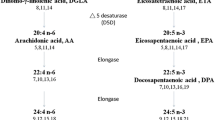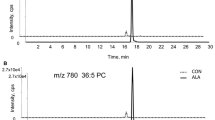Abstract
The metabolites of linoleic (LA) and α-linolenic (ALA) acids are involved in coronary heart disease. Both n-6 and n-3 essential fatty acids (EFAs) are likely to be important in prevention of atherosclerosis since the common risk factors are associated with their reduced 6-desaturation. We previously demonstrated the ability of heart tissue to desaturate LA. In this study we examined the ability of cultured cardiomyocytes to metabolize both LA and ALA in vivo, in the absence and in the presence of gamma linolenic acid (GLA), eicosapentaenoic acid (EPA), docosahexaenoic acid (DHA) alone or combined together. In control conditions, about 25% of LA and about 90% of ALA were converted in PUFAs. GLA supplementation had no influence on LA conversion to more unsaturated fatty acids, while the addition of n-3 fatty acids, alone or combined together, significantly decreased the formation of interconversion products from LA. Using the combination of n-6 and n-3 PUFAs, GLA seemed to counterbalance partially the inhibitory effect of EPA and DHA on LA desaturation/elongation. The conversion of ALA to more unsaturated metabolites was greatly affected by GLA supplementation. Each supplemented fatty acid was incorporated to a significant extent into cardiomyocyte lipids, as revealed by gas chromatographic analysis. The n-6/n-3 fatty acid ratio was greatly influenced by the different supplementations; the ratio in GLA+EPA+DHA supplemented cardiomyocytes was the most similar to that recorded in control cardiomyocytes. Since important risk factors for coronary disease may be associated with reduced 6-desaturation of the parent EFAs, administration of n-6 or n-3 EFA metabolites alone could cause undesirable effects. Since they appear to have different and synergistic roles, only combined treatment with both n-6 and n-3 metabolites is likely to achieve optimum results.
Similar content being viewed by others
References
Horrobin DF: Medical uses of essential fatty acids (EFAs). In: A.T. Diplock, J.M.C. Gutteridge and V.K.S. Shukla (eds). Antioxidants, Free Radicals and Polyunsaturated Fatty Acids in Biology and Medicine. IFCS A/S, Lystrup (Denmark), 1993, pp 181–198
Brenner RR: Nutritional and hormonal factors influencing desaturation of essential fatty acids. Prog Lipid Res 20: 41–48, 1982
Mandon EC, de Gomez Dumm INT, de Alaniz MJT, Marra CA, Brenner RR: ACTH depresses delta-6 and delta-5 desaturation activity in rat adrenal gland and liver. J Lipid Res 28: 1377–1383, 1987
Peluffo RO, Ayala S, Brenner RR: Metabolism of fatty acids of the linoleic acid series in testicles of diabetic rats. Am J Physiol 218: 669–674, 1970
Lopez Jimenez JA, Bordoni A, Hrelia S, Rossi CA, Turchetto E, Zamora Navarro S, Biagi, PL: Evidence for a detectable delta-6-desaturase activity in rat heart microsomes: aging influence on enzyme activity. Biochem Biophys Res Commun 192: 1037–1041, 1993
Horrobin DF, Huang YS: The role of linoleic acid and its metabolites in the lowering of plasma cholesterol and the prevention of cardiovascular disease. Int J Cardiol 17: 241–255, 1987
Parks JS, Rudel LL: Effect of fish oil on atherosclerosis and lipoprotein metabolism. Atherosclerosis 84: 83–94, 1990
Simopoulos AP: Omega-3 fatty acids in health and disease and in growth and development. Am J Clin Nutr 54: 438–463, 1991
Knapp HR: Studies on omega-3 fatty acids. Ann Int Med 108: 767–768, 1988
Horrobin DF: Omega-6 and omega-3 essential fatty acids in atherosclerosis. Seminars in Thrombosis and Haemostasis 19: 129–137, 1993
Bordoni A, Biagi PL, Rossi CA, Hrelia S: Alpha-1-stimulated phosphoinositide breakdown in cultured cardiomyocytes: diacylglycerol production and composition in docosahexaenoic supplemented cells. Biochem Biophys Res Commun 174: 869–877, 1991
Folch J, Lees M, Sloane-Stanley GH: A simple method for the isolation and purification of total lipids from animal tissues. J Biol Chem 226: 497–509, 1957
Stoffel W, Chu F, Ahrens EH Jr: Analysis of long chain fatty acids by gas-liquid chromatography. Anal Chem 31: 307–308, 1959
Biagi PL, Bordoni A, Hrelia S, Celadon M, Turchetto E: The effect of dietary polyenylphosphatidylcholine on microsomel delta-6-desaturase activity, fatty acid composition and microviscosity in rat liver under oxidative stress. J Nutr Biochem 4: 690–694, 1993
Hagve TA, Sprecher H: Metabolism of long chain polyunsaturated fatty acids in isolated cardiac myocytes. Biochim Biophys Acta 1001: 338–344, 1989
Mohammed BS, Hagve TA, Sprecher H: The metabolism of 20- and 22-carbon unsaturated acids in rat heart and myocytes as mediated by feeding fish oil. Lipids 25: 854–858, 1990
Brenner RR, Peluffo RO: Effect of saturated and unsaturated fatty acids on the desaturation in vitro of palmitic, stearic, oleic, linoleic and linolenic acids. J Biol Chem 241: 5213–5219, 1966
Voss A, Reinhart M, Sankarappa S, Sprecher HJ: The metabolism of 7,10,13,16,19-docosapentaenoic acid to 4,7,10,13,16,19-docosahexaenoic acid in rat liver is independent of a 4-desaturase. J Biol Chem 266: 19995–20000, 1991
Fujiwara F, Todo S, Ismashuku S: Antitumor effect of gamma-linolenic acid on cultured human neuroblastoma cells. Prost Leuko Med 15: 15–34, 1984
Takeda S, Horrobin DF, Manku MS: The effects of gamma-linolenic acid on human breast cancer cell killing, lipid peroxidation and the production of Schiff-reactive materials. Med Sci Res 20: 203–205, 1992
Author information
Authors and Affiliations
Rights and permissions
About this article
Cite this article
Bordoni, A., Lopez-Jimenez, J.A., Spanò, C. et al. Metabolism of linoleic and α-linolenic acids in cultured cardiomyocytes: Effect of different N-6 and N-3 fatty acid supplementation. Mol Cell Biochem 157, 217–222 (1996). https://doi.org/10.1007/BF00227901
Issue Date:
DOI: https://doi.org/10.1007/BF00227901




